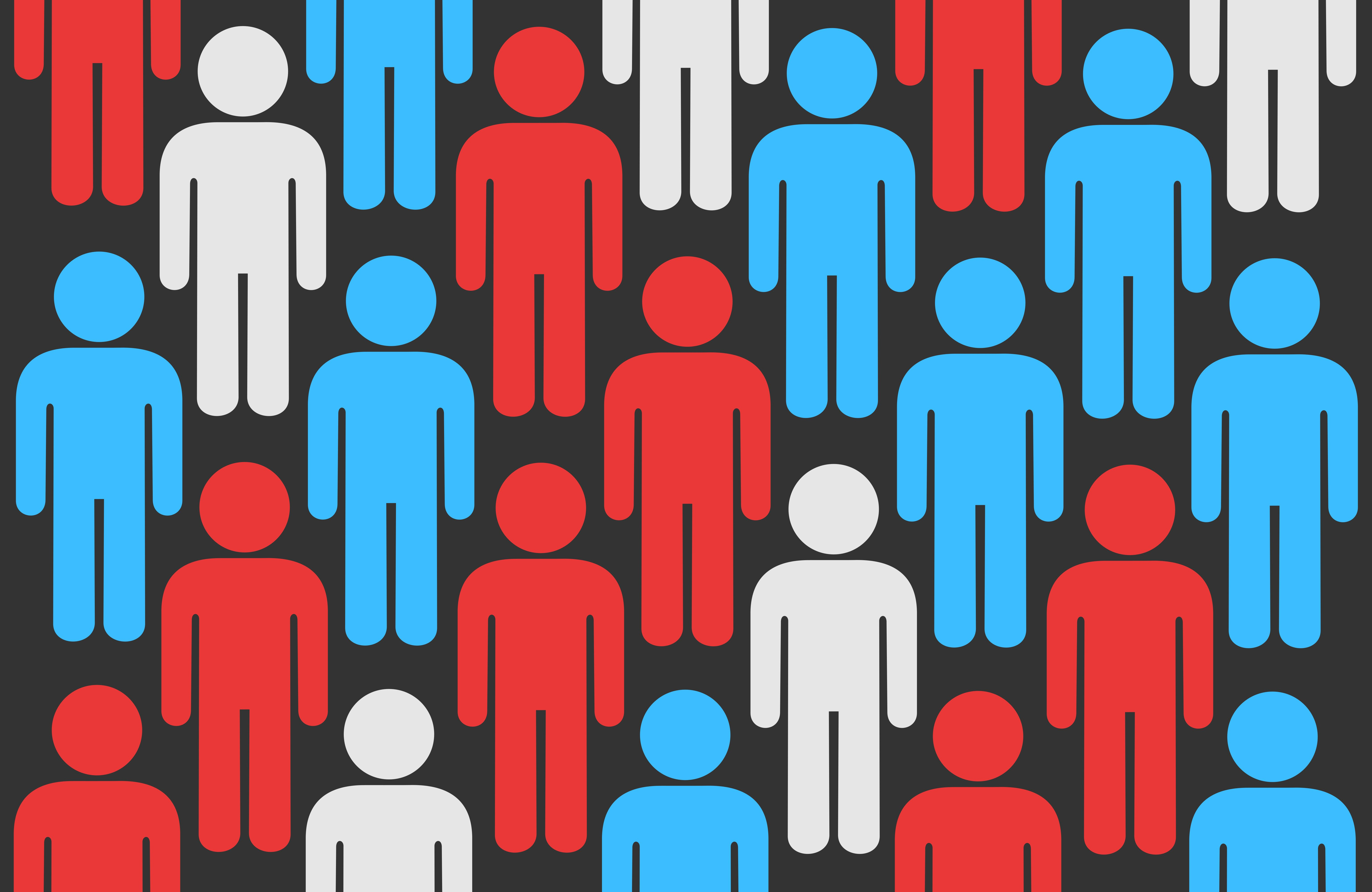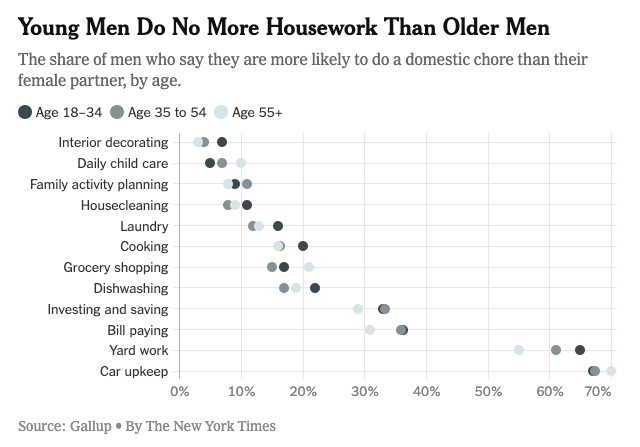Newsletter June 15, 2023
Are Young Men Becoming Conservative?

What the heck is happening with young men? To read many informed observers on the subject is to experience whiplash.
- A new report, “The State of American Men 2023: From Confusion and Crisis to Hope,” found that more than half of young men believe men have a harder time in America today than women. The report also revealed considerable ambivalence about the influence of feminism, particularly among Gen Z men.
- Jean Twenge’s book, Generations, shows 12th grade boys becoming much more conservative, jumping about 20 points over the last couple of decades.
- A recent Atlantic article by Lyman Stone and Brad Wilcox suggests that single men are slightly more conservative than they once were.
Offering a rebuttal, Matthew Yglesias notes that young men demonstrated strong Democratic commitments in the recent midterm election. Citing Catalist data, he shows that nearly 60 percent of young men voted Democratic in 2022. Young men may vote less Democratic than young women, but these findings are not consistent with the thesis that young men have become conservative.
My analysis of Gallup surveys shows little change in the political views of young men over the past 20 years. Young men are more conservative than liberal (31 percent vs. 24 percent, respectively), but a plurality (43 percent) identify as moderate. The conservative lean of young men is notable, but there’s not any evidence of a rightward drift. So, what’s going on here?
Different Formative Political Experiences
One reason why the politics of young men have changed so little is that they have not had the same type of formative experiences as young women. Last year, I wrote about the remarkable political transformation occurring among young women. The Dobbs decision was a political accelerant for young women—it was the most important issue for them heading into the 2022 midterms. It was hardly the only formative political experience either. The #MeToo movement, and Donald Trump’s election, were seminal political events in the lives of many young women. These experiences continue to shape the outlook of young women who increasingly perceive society as hostile to women and believe that the experiences of other women in the US are connected to what happens in their own lives.
I cannot think of any comparable experiences for young men. If young men have become more conservative, there are no obvious explanations. You could argue that #MeToo alienated young men, but they are more likely to support the movement than not. Further, young men do not appear overly concerned about the prospect of being falsely accused of sexual misconduct. What about Donald Trump? Young men are not overly fond of Trump, even if they are not quite as hostile to him as young women.
It’s not only these seismic political events that are important. The growing number of young people coming out as LGBTQ has transformed the social lives of young adults. But here again, this change may impact young women more than men. Nearly seven in ten young women have a close friend who identifies as LGBTQ, but only about half of young men do. The composition of social networks constitute a big part of the reason why young people are so supportive of LGBTQ policies. The same is true when it comes to relationships with people of the opposite gender. More than half of young men report having few or no close female friends, which assuredly impacts the degree to which they understand women's experiences. It might explain the yawning divide when it comes to views about gender discrimination. Young men are far less likely than young women to believe that society generally treats men better than women (48 percent vs. 72 percent).
Without these formative political experiences, what emerges is a type of political apathy. Young men are less engaged on key political issues, even if they are not voting at lower rates than young women. For young women, three issues are uniquely salient: climate change, gun policy, and abortion. Young men express far less interest in these issues. Young men seem to care more about economic issues—inflation is high on their list of priorities—but they appear less invested in culture war topics or issues that do not affect them directly. Despite being generally supportive of abortion rights, it is hardly a priority for young men. In a poll we released late last year, young men were approximately 30 points less likely than young women to say abortion was a critical concern (32 percent vs. 61 percent, respectively).
The Politics of Masculinity
On the right, there is a move to reassert a masculine politics that is aggressive, unapologetic, and dominant. This view is exemplified in Josh Hawley’s recent book, Manhood: The Masculine Virtues America Needs. In it, he reflects on the sorry state of American masculinity, attributing much of the collapse to traditional masculine virtue of feminists and liberals.
Nowhere does polling paint a more confusing picture of young men than on issues related to gender. Young men generally acknowledge the problem of pornography, but they show less appetite to restrict access. Young men support women working outside the home and an equitable division of domestic labor, at least in principle. But when it comes to taking the lead in household responsibilities, young men are far more circumspect. Only 35 percent of young men say that more stay-at-home fathers and working mothers are a good thing for society. In contrast, a majority (56 percent) of young women say this is a positive development. A surprising number of young men embrace conventional gender roles as well. Thirty-eight percent of young men believe that “society is better off when men and women stick to the jobs and tasks they are naturally suited for.”
Part of this ambivalence likely stems from how young men understand masculinity. In the New York Times, Claire Cain Miller finds that young men are still doing far less housework than their female partners. Miller suggests that the reason young men might avoid this type of work is because of what cooking, cleaning, and childcare would say about them. “Masculinity is strongly tied to earning an income and avoiding things that are considered feminine,” she writes. Being masculine is still important for many young men too. Nearly half of young men say it’s personally important that others perceive them as masculine or manly, a rate that’s actually higher than for older men.

A Lack of Direction in Life and Politics
One reason I’ve been reluctant to write a piece about the politics of young men is that surveys do not provide a definitive picture. It’s possible the sense of political disorientation emerging from surveys simply reflects their lived experiences. Of Boys and Men author Richard Reeves believes that young men are struggling to find motivation and meaning in their lives. Weakening social ties, greater apathy towards educational and career ambitions, and pervasive feelings of loneliness drive what Reeves called “a sense of a passivity, of drift, of a bit — checking out a little bit among young men and boys” in a recent interview with Ezra Klein.
There is also the question of where young men fit in a rapidly changing society. Are young men adversaries or allies when it comes to issues such as gender equality? Young men appear to be quiescent when it comes to ceding the historic advantages men have enjoyed in American society. Whether this is due to the fact they believe these changes are just and fair or simply inevitable is unclear. Most young men say that the country would be better off if more women served in political office, even if they are less enthusiastic about it than young women. They also reject two-to-one the idea that the gains women made in recent years have come at the expense of men . Many young men are adjusting to new social norms, if sometimes a bit awkwardly. I was at a coffee shop recently when I overheard three high school boys discussing an upcoming exam. I only remember this conversation because, at one point, one of the boys said to the other in a frustrated voice: “Stop mansplaining this to me!” And yet, nearly half of young men believe that American society has become “too soft and feminine.”
More than anything, what characterizes the outlook of young men is confusion and uncertainty. You certainly see this in dating. Young men today are adapting to behavioral requirements foreign to older generations of men. Obviously, many of these changes are long overdue. Still, it can be disorienting. There are too few positive models of behavior for young men, and a growing number of counterproductive ones. Conservatives appear more eager to engage on these issues, but it’s not clear whether this will translate into a dramatic shift in voting preferences; at least, not immediately. Concerns about social inequality, distrust of corporations, and comfort with cultural pluralism remain salient political considerations for young adults—men and women alike. At the same time, I don’t have a hard time believing that certain Republican candidates can attract support from young men; it’s just not going to be Josh Hawley.








